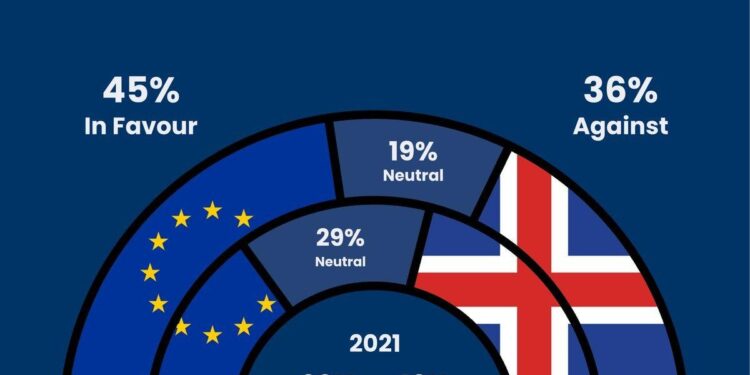Iceland is set to hold a referendum later this year that could redefine its relationship with the European Union, but the details surrounding the vote remain unclear and have sparked considerable public confusion. As the island nation grapples with its EU membership ambitions amid shifting political landscapes, questions persist over the referendum’s purpose, implications, and what voters are actually being asked to decide. This uncertainty has prompted debates both within Iceland and across Brussels, highlighting the complexities involved in the country’s ongoing dialogue with the EU.
Iceland Faces Complex Choices in Upcoming EU Relations Referendum
Iceland finds itself at a crossroads as the upcoming referendum calls for a nuanced decision on its future relationship with the European Union. The population faces a labyrinth of choices, balancing economic interests, national sovereignty, and environmental concerns. Supporters of closer ties emphasize potential benefits such as improved trade opportunities, stronger investment flows, and access to EU funding programs. Meanwhile, critics warn against perceived loss of autonomy, possible restrictions on Iceland’s natural resources, and the complex legal implications of EU membership.
The referendum’s complexity is compounded by the diverse opinions across political parties, industry sectors, and the public. Key issues under debate include:
- Fisheries management: Will Iceland maintain control or adopt EU quotas?
- Monetary policy: The impact of aligning or diverging from the Eurozone
- Environmental regulations: Balancing sustainability with business freedom
Below is a simplified overview of potential scenarios post-referendum:
| Outcome | Main Consequences | Public Sentiment |
|---|---|---|
| Closer EU Integration | Access to single market; Loss of some sovereignty | Divided but hopeful among youth |
| Maintaining Current Status | Continued independence; Limited market access | Strong support in rural districts |
| Negotiated Partnership | Tailored cooperation; Complex legal framework | Mixed reactions; calls for clarity |
Key Challenges and Ambiguities Cloud Voter Decisions on EU Membership Terms
The upcoming referendum in Iceland has been marked by a shroud of confusion as voters grapple with complex and often contradictory information about the terms of EU membership. Central to the uncertainty are unresolved questions regarding sovereignty, fishing rights, and economic regulations that deeply impact Iceland’s key industries. Citizens are left weighing ambiguous benefits against potential compromises to national control, with official communications failing to clarify the practical implications of accession. This vacuum of clear guidance has intensified skepticism and fueled polarized public discourse.
Adding to the challenge is the lack of transparent comparative data outlining how EU membership would affect Iceland’s current trade agreements and domestic policies. Key areas driving debate include:
- Fisheries management: Concerns over quota allocations and access rights under the Common Fisheries Policy.
- Economic autonomy: Potential constraints on Iceland’s financial regulations and currency control.
- Legal integration: Uncertainties surrounding the adoption of EU laws and dispute resolution mechanisms.
| Key Concern | Current Status | EU Membership Impact |
|---|---|---|
| Fishing Rights | Full national control | Shared quotas under EU rules |
| Currency | Icelandic króna | No Eurozone participation guaranteed |
| Trade Agreements | Independent bilateral deals | Aligned with EU external policies |
Experts Call for Greater Clarity and Public Engagement Ahead of the Vote
Ahead of the highly anticipated referendum, experts emphasize the urgent need for clear and transparent information to the Icelandic public. Many analysts warn that the current framing of the vote has left voters confused about the potential consequences of their decision on the nation’s future relationship with the European Union. Without comprehensive public dialogue, misconceptions could drive turnout and results, undermining the democratic process. Civil society groups are also calling for increased access to unbiased resources to help citizens navigate the complex legal and economic implications of the referendum.
To foster greater public engagement, several key measures have been proposed:
- In-depth informational campaigns utilizing multiple media platforms
- Open forums and debates featuring experts from diverse backgrounds
- Easy-to-understand summaries of potential benefits and risks
- Transparent reporting on how the results could influence Iceland’s international position
Without a concerted effort to demystify the referendum’s stakes, experts caution that voter apathy or polarization could skew outcomes, leaving the nation grappling with uncertainty.
| Aspect | Current Challenge | Suggested Solution |
|---|---|---|
| Information Access | Complex legal jargon | Plain language summaries |
| Public Debate | Lack of balanced forums | Inclusive expert panels |
| Media Coverage | Fragmented messaging | Coordinated multi-platform campaigns |
Closing Remarks
As Iceland approaches its upcoming referendum on relations with the European Union, voters face a complex decision shaped by economic, political, and sovereignty considerations. The outcome remains uncertain amid divergent views on membership benefits and national identity. Observers both within Iceland and across Europe will be watching closely, as the referendum’s results could significantly impact Iceland’s future relationship with the EU and the broader regional dynamic.
















